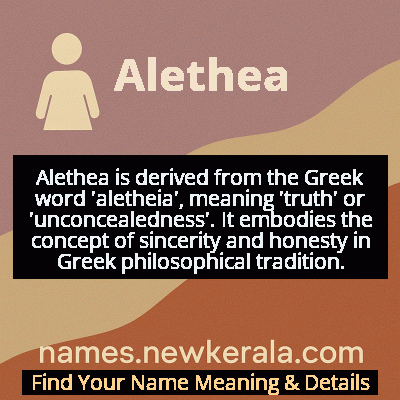Alethea Name Meaning & Details
Origin, Popularity, Numerology Analysis & Name Meaning of Alethea
Discover the origin, meaning, and cultural significance of the name ALETHEA. Delve into its historical roots and explore the lasting impact it has had on communities and traditions.
Name
Alethea
Gender
Female
Origin
Greek
Lucky Number
7
Meaning of the Name - Alethea
Alethea is derived from the Greek word 'aletheia', meaning 'truth' or 'unconcealedness'. It embodies the concept of sincerity and honesty in Greek philosophical tradition.
Alethea - Complete Numerology Analysis
Your Numerology Number
Based on Pythagorean Numerology System
Ruling Planet
Neptune (Ketu)
Positive Nature
Intuitive, analytical, spiritual, and inquisitive.
Negative Traits
Secretive, reserved, aloof, and can be overly critical.
Lucky Colours
Green, yellow.
Lucky Days
Monday.
Lucky Stones
Cat’s eye, moonstone.
Harmony Numbers
1, 5, 6.
Best Suited Professions
Scientists, researchers, spiritual leaders, detectives.
What People Like About You
Depth of knowledge, analytical skills, spirituality.
Famous People Named Alethea
Alethea McGrath
Actress
Portrayed Jedi Master Jocasta Nu in Star Wars: Episode II
Alethea Kontis
Author
New York Times bestselling fantasy author
Alethea Arnaquq-Baril
Filmmaker
Award-winning documentary filmmaker for 'Angry Inuk'
Lady Alethea Howard
Aristocrat
Prominent Elizabethan era patron of the arts
Name Variations & International Equivalents
Click on blue names to explore their detailed meanings. Gray names with will be available soon.
Cultural & Historical Significance
During the Renaissance and Enlightenment periods, Alethea experienced a revival as classical learning was rediscovered and valued. The name became particularly popular among educated families and aristocracy who appreciated its intellectual and virtuous connotations. In 17th-century England, Puritan families often chose virtue names like Alethea to express their religious values, while aristocratic families used it to signal their classical education and refinement. The name's association with truth and integrity made it a powerful choice during periods of social and religious reformation, when concepts of personal honesty and spiritual truth were highly valued. This historical usage pattern demonstrates how Alethea has consistently been chosen by families seeking to express deep philosophical and moral values through naming traditions.
Extended Personality Analysis
Individuals bearing the name Alethea are typically characterized by their unwavering commitment to truth and authenticity. They often possess a natural inclination toward intellectual pursuits and philosophical inquiry, driven by a deep-seated need to understand the world around them. These individuals tend to be perceptive and analytical, with an ability to see through superficialities to grasp underlying realities. Their honesty, while sometimes challenging for others, usually stems from a genuine desire for clarity and meaningful communication rather than any intention to cause discomfort.
In social contexts, Aletheas are often valued as trusted advisors and confidants due to their reliability and moral consistency. They typically approach relationships with sincerity and depth, preferring meaningful connections over casual acquaintances. Professionally, they excel in fields that require research, analysis, teaching, or counseling—any area where truth-seeking and clear communication are essential. While their directness can sometimes be misinterpreted, most Aletheas develop the emotional intelligence to balance truth-telling with compassion. Their philosophical nature often makes them thoughtful leaders who consider ethical implications carefully, and their commitment to principles rather than popularity can make them powerful agents of positive change in their communities.
Modern Usage & Popularity
In contemporary naming practices, Alethea occupies a unique position as a classical name that feels both timeless and distinctive. While it has never reached the popularity heights of names like Sophia or Olivia, it maintains a consistent presence, particularly among parents seeking names with intellectual depth and historical significance. Recent decades have seen a gradual increase in usage, partly driven by the trend toward mythological and virtue names. The name performs particularly well in educated and literary circles, where its philosophical roots are appreciated. In the United States, Alethea typically ranks outside the top 1000 names but shows steady usage of approximately 50-100 births annually. In the United Kingdom and Australia, the name enjoys slightly higher popularity relative to population size. Modern parents often choose Alethea as an elegant alternative to more common classical names, appreciating its beautiful sound, rich meaning, and the positive values it represents. The name's versatility allows it to work well in both formal and casual contexts, making it a practical yet distinctive choice for contemporary children.
Symbolic & Spiritual Meanings
Symbolically, Alethea represents the eternal human quest for truth and understanding beyond mere surface appearances. The name embodies the philosophical journey from ignorance to enlightenment, serving as a metaphor for the process of revelation and discovery. In symbolic terms, Alethea connects to imagery of light emerging from darkness, clarity replacing confusion, and authenticity triumphing over deception. The ancient Greek concept of aletheia as 'unconcealment' gives the name powerful symbolic weight, representing the moment when hidden realities become apparent and true understanding dawns. This makes Alethea a symbol of both personal and collective awakening—the process through which individuals and societies come to recognize fundamental truths about themselves and their world. The name also carries connotations of courage and integrity, as facing truth often requires bravery and moral strength. In many spiritual traditions, the pursuit of truth represents the highest form of wisdom, making Alethea a powerful emblem of both intellectual and spiritual enlightenment. The name's symbolic richness makes it particularly meaningful for those who value depth, authenticity, and the continuous pursuit of understanding in their personal and philosophical lives.

